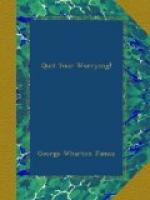What had I on
earth to do
With the slothful, with the mawkish, the
unmanly?
Like the aimless, helpless, hopeless,
did I drivel
—Being—Who?
One who never turned his back but marched
breast forward,
Never doubted clouds would
break,
Never dreamed, though right were worsted,
wrong would triumph,
Held we fall to rise, are baffled to fight
better,
Sleep to wake.
No, at noonday in the bustle of man’s
worktime
Greet the unseen with a cheer!
Bid him forward, breast and back as either
should be,
‘Strive and thrive!’ cry ’Speed,—fight
on, fare ever
There as here!’
And this is not “mere poetry.” Or rather it is because it is “mere poetry” that it is real life. Browning had nearly seventy years of it. He knew. Where there are those to whom “God has whispered in the ear,” there is no uncertainty, no worry. The musician who knows his instrument, knows his music, knows his key, and knows his time to play never hesitates, never falters, never worries. With tone clear, pure, strong, and certain, he sends forth his melodies or harmonies into the air. Cannot you, in your daily life, be a true and sure musician? Cannot you be certain—absolutely, definitely certain—of your right to play the tune of life in the way you have it marked out before you, and then go ahead and play! Play, in God’s name, as God’s and man’s music-maker.
CHAPTER XIII
RELIGIOUS WORRIES AND WORRIERS
Misunderstandings, misconceptions, and ignorance in regard to what really is religion have caused countless millions to mourn—and worry; indeed, far more to worry than to mourn. Religion should be a joyous thing, the bringing of the son and daughter into close relationship with the Father. Instead, for centuries, it has been a battle for creeds, for mental assent to certain doctrines, rather than a growth in brotherhood and loving relationship, and those who could not see eye to eye with one another deemed it to be their duty to fight and worry each other—even to their death.




